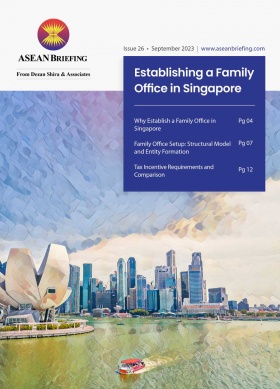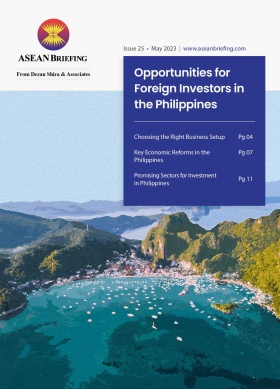Singapore Family Office Setup: Structural Model and Entity Formation
Families must establish their objectives to identify which corporate structure that aligns most effectively with their requirements. There are two main types of family offices: single-family offices (SFO) and multi-family offices (MFO). An SFO manages the investments and assets of a single family whereas an MFO manages the investments and assets of more than one family that are not necessarily related to each other.
Further, factors such as the size of the family wealth, the number of family members involved in the decision-making process, as well as the overall complexity of the family’s finances, will impact the structural model of the family office.
Family office structure: Choosing the right entity
Establishing a Singaporean private limited company by shares or trust are two of the most efficient and popular entities for the family office structure.
The structure starts with a holding company (either a private limited company or a trust), which owns two entities; the investment fund, which holds the family’s assets; and the family office (also can be a private limited company), which acts as the fund manager.
The investment fund can be in the form of a variable capital company (VCC). The VCC can act as an umbrella fund and can have several sub-funds that help to mitigate liability.Importantly, choosing the type of entity and its jurisdiction of incorporation will impact the fund’s eligibility to receive tax incentives. For instance, if the fund is incorporated outside of Singapore, it would not require approval from the Monetary Authority of Singapore (MAS), have no restrictions on the minimum assets under management, and have no restrictions on its minimum business spending. However, the fund would not be eligible to benefit from Singapore’s vast tax treaties.

Private limited company by shares
A private company limited by shares, also known as a private limited company, is by far the preferred structure among foreign companies for setting up a local business presence in Singapore. As a private limited company can be wholly owned by a foreign individual and/or corporate investor, this legal entity can be established as a regional holding company or subsidiary of the foreign holding company.
Key requirements for setting up a private company limited by shares
- Reservation of company name
- The company name must be approved by the Accounting and Corporate Regulatory Authority (ACRA) prior to the company registration process.
- Once a name is selected, the name application shall be submitted via ACRA Bizfile for approval, which may be rejected if the name is identical, similar, or phonetically similar to a company that has already been registered.
- The name application costs S$15 (US$11.1), which will be reserved for 120 days upon approval.
- Appointment of company officers
The officers of a company include the following:
- Director:
- The appointment of at least one director who is either a Singaporean citizen, permanent resident, or EntrePass / Employment Pass holder; and
- The director needs to be at least 18 years of age and must not have a history of misconduct or bankruptcy in their work history.
- Auditor (to be appointed within 3 months of incorporation unless exempted from audit requirements);
- Company secretary (to be appointed within 6 months of incorporation); and
- Shareholders (the minimum shares issued, and paid-up capital is S$1 (US$0.74)).
- Registered address
- This must be a commercial business address in Singapore.
Trusts
Singapore’s attractive tax regime and strong regulatory framework has made the city-state a premier destination for the establishment of various types of trusts.
The types of trusts that can be established in Singapore are the following:
- Real investment trusts;
- Private family trusts;
- Statutory trusts;
- Collective investment trusts; and
- Charitable trusts.
Some of the key benefits to establishing a trust in Singapore are:
- No capital gains tax;
- No inheritance tax;
- Settlors are free from forced heirship claims;
- Settlors can appoint another person to supervise the trustees; and
- No estate duty, among others.
Requirements to establishing a trust
A trust can be created by a will, declaration, or deed, and must be specific and clear in its subject matter (the trust property) and its objects (clearly identifies the beneficiaries). The beneficiary can be a third person or entity (another trust, company, or charity) that will benefit from the trust.
- Choosing a trustee
The trustee must be a Singapore citizen or a Singapore-incorporated company.
- Preparing the trust deed
The settlor and the trustee must prepare a trust deed, which sets out the terms and conditions of the trust. The trust deed must comply with the laws regulating trusts in Singapore, namely, the Trust Companies Act, the Business Trust Act, and the Civil Law Act.
- Transferring the assets to the trust
The settlor must transfer the assets to the trust.
- Registering the trust
It is not mandatory to register a trust in Singapore. However, it may be beneficial to register with ACRA for tax purposes.
Variable capital company
On January 15, 2020, the MAS and ACRA launched the variable capital company, a new innovative corporate structure for all types of collective investment schemes (investment funds) in Singapore.
As such, the VCC can be used as a standalone fund (comprising of a single investment portfolio) or as an umbrella entity with various sub-funds allowing for the segregation of portfolios and liabilities. Having multiple funds in a single VCC can improve cost efficiencies.
Further, the VCC capital will always be equal to its net assets. This is because the VCC’s shares are only created when investments are made. This provides flexibility in the distribution and reduction of capital as dividends can be paid out of capital, easing the ability of fund managers to meet dividend payment obligations. Fund managers can also easily re-domicile existing overseas investment funds by transferring their registration as a Singapore VCC.
What are the requirements of a VCC?
There are several key components of the VCC:
- The VCC must have at least three directors who are Singaporean residents. At least one director must be a representative of the fund manager.
- The VCC will require a Singapore-regulated and licensed fund manager or it can use a Singapore-licensed bank to be the fund manager. The entity cannot be self-managed.
- The VCC can have a single shareholder or hold a single asset.
- The requirements for investment funds listed under the Existing Securities and Futures Act (SFA) will apply to VCCs.
- The VCC must have a registered office in Singapore and appoint a Singapore-based secretary.
- It must be audited by a Singapore-based auditor and present its financial statements as per the International Financial Reporting Standards (IFRS) or US GAAP.
Licensing
Since SFOs manage the wealth of a single family, they are not subject to licensing and regulation under Singapore’s Securities and Futures Act (SFA), or they can seek case-by-case licensing exemption from MAS.
In July 2023, MAS is proposing a new regulatory framework for SFOs in Singapore that would allow MAS to enhance its defense against money laundering in the SFO industry.
The proposed framework aims to provide a set of qualifying criteria that, if fulfilled, the SFO will be exempted from licensing requirements to conduct fund management in Singapore. Under the proposed framework, MAS will introduce a new class licensing exemption for SFOs and remove the case-by-case licensing exemption route. Interest parties have until September 30, 2023 to submit their comments to MAS regarding its proposal.What are the qualifying criteria under the proposed new framework?
If an SFO wants to conduct fund management activities in Singapore under the proposed class exemption, the SFO must meet the following criteria:
- The SFO must be an incorporated company in Singapore.
- The SFO must be wholly owned (directly or indirectly) by members of the same family. Family members are proposed to be defined as lineal descendants of a common ancestor.
- The SFO must conduct fund management activities on behalf of:
- Family members, including trusts and corporations, which the family wholly owns; and/or
- Charitable organizations, which are funded by the family.
- The SFO must establish and maintain business relations with at least one MAS-regulated financial institution.
- The SFO must always have a designated employee who is a resident of Singapore to serve as the point of contact between the SFO and MAS.
MFOs, however, are subject to licensing and regulation under the SFA. The MFO will need to apply for a Capital Market Services License from MAS.
In conclusion, establishing a family office requires careful consideration of objectives and structural models. The choice between a single-family office or a multi-family office depends on the family’s unique needs, wealth size, family involvement, and financial complexity. When it comes to structuring the family office, Singapore offers efficient options, primarily through private limited companies or trusts.
About Us
ASEAN Briefing is produced by Dezan Shira & Associates. The firm assists foreign investors throughout Asia and maintains offices throughout ASEAN, including in Singapore, Hanoi, Ho Chi Minh City, and Da Nang in Vietnam, in addition to Jakarta, in Indonesia. We also have partner firms in Malaysia, the Philippines, and Thailand as well as our practices in China and India. Please contact us at asean@dezshira.com or visit our website at www.dezshira.com.
- Previous Article Strengthening Family Office Participation in Singapore’s Financial Ecosystem
- Next Article Why Establish a Family Office in Singapore







